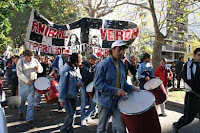So Cristina Fernández de Kirchner walked off with rather a decisive victory in last month’s presidential election, obtaining 53.96% of all votes and avoiding a second round of voting (in Argentine presidential elections if one candidate achieves more that 45% of votes or more than 40% with a 10% advantage over their closest rival then there is no second round of voting). Cristina, and her Vice-president elect and Economy Minister Amado Boudou took 23 of the 24 provinces of the country, losing out only in San Luis to Rodriquez Saá, and turning their victory for the FPV into the biggest since the return of democracy in 1983.
There were, of course, the customary celebrations with thousands partying in the streets and plazas throughout the country and Cristina delivering an emotional speech to the thousands of Peronistas in Plaza de Mayo in Buenos Aires after her victory was official.
But a week or so later the time to party is over and CFK and Boudou are, some might say finally, considering the real issues which the country faces.
On October 31, Boudou announced new rules regarding the purchasing of foreign currency which he said were to “fight money laundering and the black market,” and to combat capital flight, which is estimated at 73 billion dollars during the last five years.
The AFIP tax revenue office will be responsible for controlling the new rules, clearing all transactions made in banks and foreign-exchange houses and registering every transaction by individuals and companies on an online system; but until that takes affect, all sales of foreign currency through ATMs, Internet banking and phone banking were suspended.
Many politicians however, including a former Central bank head, Alfonso Prat Gay say that the best way to deal with capital flight is not with controls but with “a strong and significant battle against inflation, which is the deeper problem,” - something which he suggests the government is reluctant to confront due to the fact it’s been “denying and hiding inflation for so long.”
He explained that the completely standard practice in Argentina of saving in dollars instead of in pesos is obviously due to the inflation rate, and argued that the new controls are “absolutely pointless” since “the only thing they’ll achieve is to increase the informal market”. The Fitch ratings agency also warned that going down the road of such unorthodox polices represents nothing but risk.
An announcement from Boudou yesterday of a full lift on subsidies however, might actually help bring down inflation. Presently in Argentina, the government subsidises, among other industries, transport, electricity, gas and water companies, keeping prices low for the consumer but confusing the market. The policy is expected to produce annual fiscal savings of 600 million pesos and could introduce a more competitive nature into the markets.
On a social note, it seems Cristina is finally coming out and openly criticising the protestors (most of whom are her supporters) who on a daily basis block streets, motorways and avenues to bang drums, sing and shout and protest, causing havoc and disruption for the commuters.
 |
| Piqueteros taking over the streets |
Known as piqueteros in Argentina (a local word that comes from the English ‘picket’), many are members of political factions, though it often appears that most are just there for the joy of making noise and having a laugh. The majority of porteños at least get generally sick of them and on Tuesday Cristina had a proper go at those piqueteros who set up a roadblock on the Ricchieri highway preventing thousands of commuters getting into Buenos Aires for work.
“That wasn't social protest, but a ridiculous ploy,” she said, going on to urge citizens “not to protest on the streets, but to do so on pavements and in plazas.”
“We won’t criminalize social protests, but what happened today wasn’t a social protest but a ridiculous ploy by people wanting to cause disruption for fellow citizens,” she added.
This fresh standpoint is in total contrast to the previous policy of her late husband, former President Nestor Kirchner, who was known to encourage such protests as he built close ties with the labour unions who promote them. To the contrary Cristina has had run-ins with the likes of the ridiculously powerful labour leader Hugo Moyano, who controls the streets of Buenos Aires.
Will any of these new policies serve to help build the Argentina that the President likes to remind us she is constructing with and for 'todos los argentinos y argentinas'? Time will tell.









No comments:
Post a Comment